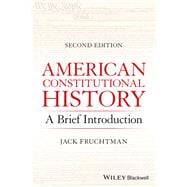American Constitutional History: A Brief Introduction, Second Edition presents a concise and accessible history of the 235-year development of the Constitution since its ratification. The book is organized around five distinct periods in U.S. history—the New Republic, the Slave Republic, the Free-Market Republic, the Social Welfare Republic, and the Contemporary Republic—to demonstrate the evolution of the American republic and its founding document over time. With an engaging narrative approach, author Jack Fruchtman describes how constitutional changes have occurred through both formal amendments and informal decisions by the president, Congress, and the Supreme Court.
Updated to cover the period from 2015 to 2021, the second edition examines the controversial presidential election of 2020 in which Donald Trump, despite losing the electoral and popular vote, claimed victory and espoused charges of widespread election fraud. New coverage of the addition of Neil Gorsuch, Brett Kavanaugh, and Amy Coney Barrett to the Supreme Court is complemented by discussion of important decisions made after 2015, including affirming same-sex marriage, a woman's right to abortion under certain circumstances, the right to own and carry a firearm, and the central place of religious liberty in American society. This book also:
- Highlights the Constitution's evolution through government regulation of the economy, individual and civil rights, and executive power
- Reflects the evolution of constitutional changes made by the Supreme Court up to June 2021
- Discusses topics such as the ideological origins of the U.S Constitution, the Civil War and Reconstruction, the civil rights movement, and growth of executive power
- Includes chapter overviews, summaries, and descriptions of formal constitutional amendments ratified by the states
American Constitutional History: A Brief Introduction, Second Edition is an excellent introductory textbook for upper-level undergraduate and graduate courses in American history and political science and a must-read for general readers seeking insights into the origins and evolution of the U.S. Constitution.









